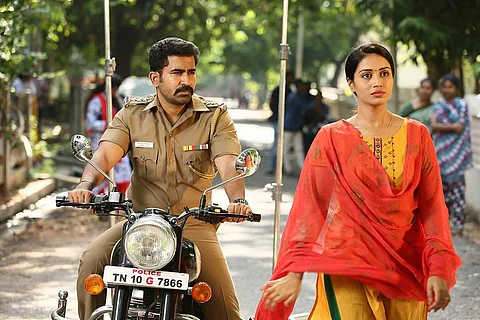

Having an office in AVM Studios, the premier landmark of Tamil Cinema, can be regarded as a sign of success in the industry. However, Vijay Antony, sitting on a plush sofa in his office, believes he is neither that good an actor nor very good as a composer to say that he has ‘arrived’. Humility is so often a facade, but in the case of Vijay Antony, the music director-turned-actor feels it is just him being aware of his strengths. “I am a good judge of what works and what doesn’t. Success is different from talent. What we know isn’t as important as what we do with the things we know.”
Excerpts from a conversation:
Your films are known for their strong scripts. How do you choose these scripts?
Since Pichakaaran, many people say, ‘Vijay Antony selection na chumma va?’ But I am not a periya appatucker. It is just a question of taste. I listen to the script and then decide on my own. I don’t just listen to the one-line, but the entire screenplay. A one-liner will always feel more massy than the end product.
Your films tend to do well in Telugu. Does the possibility of dubbing into Telugu govern your choices?
I make films for me; I don’t think about the language. But, right from the nativity to the value systems and problems, there are a lot of similarities between the Tamil and Telugu speaking audience. That’s why our films work there.
Another unique thing about your films are the catchy titles. Even words with negative connotations are given an interesting twist.
We live according to the constructs of society. Slotting ‘Pichakaaran’ as a negative term is a very wrong thing. A beggar is a product of various circumstances. I met someone who was begging in Pondicherry temples to use the money to educate his daughter. For me, he is a hero. As for Thimiru Pudichavan, even those who are not ‘yes men’, people who are strong-minded and honest, are called so. I okay these titles to question the status quo in our society. This was broken long time back by Rajinikanth in Velaikaaran, Padikaadhavan, etc.
You have had a mixed run at the box-office. How much of an impact do you think reviews have, considering how swift they are now?
Let me ask you a question. Is it fair for someone to criticise your writing skills every single time and compare you with say Shakespeare or Jeyamohan? Is it fair for someone to constantly criticise your personal choices, personality and talent? While I am actually happy that films like Pariyerum Perumal, 96, Merku Thodarchi Malai are running because of reviews, why should reviews wound another person?
There used to be a way in which the negatives were pointed out; a gentle and a very humanitarian way, without getting personal. That isn’t there now. They can talk about how a film could have been made better, but even those reviews can come a bit later. Let the films have a bit more breathing space.
Your future projects seem to have different producers. Why the change from making films under your own production house?
I started producing because I couldn’t find a producer for my films. But now, I feel lonely doing everything on my own. Since I am getting producers now, I feel it will help me travel in this cinematic journey with a little less baggage. I will use the spare time to connect with people and spend more time with my children.
Has the actor in you superseded the composer?
Actually, yes. I believe I’m pretty good at composing mass numbers, summa nachunu pannuven, but I haven’t been able to do it in my own films, because I am not a mass hero. I do worry that the space for the composer in Vijay Antony is not being given. If I have the time, I want to compose for one mass film every year, especially since I won’t be composing for my own films for some time.
A word about your future projects...
The shooting for Kolaigaran, directed by Leelai-fame Andrew, will be done by November. After that, I will play a cop once again in a film directed by Senthil Kumar. There is also a film with Moodar Koodam Naveen bankrolled by Amma Creations in the pipeline.